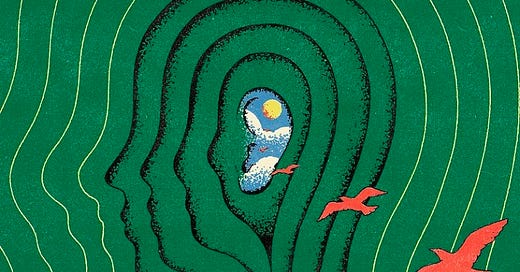“Everyone must have an opinion!” is the internet’s motto.
The more opinionated one is, the more attention one gets. And attention has become a currency of popularity, success and money. It’s the holy grail of modern content consumption.
I remember an author, who also works as a book coach, advising aspiring writers to get their opinions published in news outlets. She claimed it was the most effective way to get their career launched. It seemed that it didn’t matter whether an opinion was fully formed or even rational. In a way, the more outlandish the opinion, the more clicks it attracts.
Sadly, that writer’s advice isn’t completely unfounded. In the past five years, “the New York Times' 'Opinion' section has doubled in size.” As Charlotte Klein from New York Magazine puts it, the Opinion section of newspapers is “both looked down upon by reporters as a factory that churns out bland 800-word “takes” and feared by executives for the outsize controversy it can occasionally create.”1
As with most things, the motivation is most likely financially driven. Not only do opinions, especially polarizing ones, lead to more clickbait, but they’re also cheap to produce. They don’t require months (or years) of long journalistic investigations, nor do they demand entire fact-checking teams.
Opinions don’t need a strong foundation. In fact, they thrive in the shaky arena of volatile feelings. They can simply be sparked by a person’s emotional outrage or moral righteousness. Technically opinions are neither right nor wrong, so they’re also more legally safe. The media (whether traditional or social) that publishes them isn’t endorsing, but simply sharing.
But opinions feel like junk food to me. Tempting on the surface, perhaps momentarily tasty but designed to be addictive and ultimately harmful. Perhaps in small doses they’re fine, but I rather pass on making them the main course of my digital intake.
What I value more than opinion is experience. I want to read, hear, see those who have first hand exposure to a topic. I trust those who source from their own lives, which may be peculiarly singular but often turns out to be universally applicable. And if it’s not from their own lived insight, then at least from having close contact with those who have walked through the fire (and come through the other side).
Holding off on spewing every opinion that crosses our mind doesn’t mean that we should be wallflowers without a voice. If fear is driving our silence then it should be questioned. But sometimes fear can also be the motivator for our words. We may be afraid of being ostracized or dismissed if we don’t partake in the choir of opinions. In those cases, our words become meddled in the noise machine, rather than bridges of meaning and connection.
For the Present Sense weekend edition, I typically share 7 sensory recommendations: something to SEE, HEAR, SMELL, TASTE, TOUCH, BALANCE, and ENVISION.
But this week, I’d love to hear from YOU.
What kind of sensory experiences have inspired you lately?
Please share your sensory recommendations — including books, films, nature sights, songs, podcasts, recipes, poems. You can leave them in the comments below or email them to sabrina@sevensenses.world — I’m hoping to feature some of them in the next Present Sense edition.
In Joy,
Sabrina
New York Magazine ‘The Opinion That Ate the Paper’ (May 16, 2025)







My hot take is that I’m sick of hot takes! 😂 Love this, Sabrina. I made Popsicles this weekend: taste, smell, touch, sight and hearing were all involved. ❤️
For SMELL: I went to an event at a friend's house this week that she was organizing and figured I should bring her something, so I made a bundle of rosemary, thyme, and lemon balm. It smelled so lovely.
Also can't stop thinking about some perfumes I encountered while I was in Australia: https://theraconteur.co/collections/all-fragrance